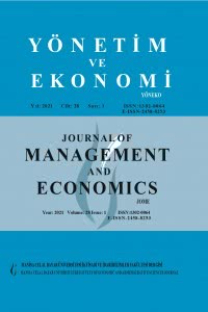An exploratory study on implementation of Lean Manufacturing practices (with special reference to automobile sector industry)
Yalın imalat ile ilgili günümüzdeki senaryo, dünya çapında bir fenomen haline gelmiş olmasıdır. Yalın imalat, irili ufaklı tüm şirketlerin ilgisini çekme konusunda başarılı olmaktadır. Çok sayıda firma, yalın üretim teknolojilerini takip etmekte ve kalite, üretim, müşteri hizmeti ve kârlılık konularında büyük yol almaktadır. Yalın imalat, sürekli iyileştirme aracılığıyla üretimde israfı tanımlayan ve ortadan kaldıran sistematik bir yaklaşımdır. Hindistan’daki imalat endüstrisi, avantajlarını, büyük yer pazarı, hammadde ve vasıflı işgücü açısından iyi koşulları ve kalite odaklılığı güçlendirmenin yollarını aramak zorundadır. Hindistan’da eyalet düzeyinde, yalın imalat tekniklerini uygulayan birkaç şirket bulunmaktadır. Madhya Paradesh’in sanayi bölgesi olan Dewas şehrinde bazı otomobil şirketleri, israfı ve maliyeti azaltmak için yalın imalat tekniklerini uygulamaktadır. Özetle, tüm bu faktörlerin, otomobil endüstrisindeki yalın üretim uygulamalarını analiz eden ve çalışan araştırmacılara rehberlik edecektir.
Yalın imalat faaliyetine yönelik bir uygulama (otomobil endüstrisi örneği)
At present scenario, Lean Manufacturing has become a world wide phenomenon. It is quite successful in drawing the attention of companies of all sizes. A large number of organizations are following Lean technologies and experiencing vast improvements in quality, production, customer service, and profitability. Lean Manufacturing is a systematic approach to identifying and eliminating waste through continuous improvement. The manufacturing industry in India must also look to leverage its advantages, its large domestic market, good conditions in terms of raw materials and skilled labour, and the quality focus. In India at the state level, there are few companies that are implementing Lean manufacturing techniques. In Dewas city, the industrial town of Madhya Pradesh, some of the automobile companies are vigorously following the Lean manufacturing techniques to eliminate waste and downsize the cost. Hence, all these factors prompted the researchers to analyze and study the implication of Lean Manufacturing Practices in Automobile Industries.
___
- Bhasin, S. & Burcher, P. (2006). Lean viewed as a philosophy. Journal of Manufacturing Technology Management.
- Dankbaar, B., 1997, “Lean production: denial, confirmation or extension of socio-technical systems design?,” Human Relations, 50(5).
- Hayes, R.H. and Pisano, G.P., 1994. “Beyond world class: the new manufacturing strategy”, Harvard Business Review, January-February.
- Shah, R. and Ward, P.T., 2003. “Lean manufacturing: context, practice bundles, and performance”, Journal of Operations Management.
- Wilson, L. (2010) How To Implement Lean Manufacturing. New York: McGraw-Hill
- Womack, J., Jones, D.T. and Roos, D., 1990,“The machine that changed the world,” Rawson Associates, NY. Websites
- http://www.vecv.com/sitemap.html.Browsed on18/10/2011
- http://www.eurosixsigma.com/sixsigma/sigma_calc.htm. Browsed on 11/11/2011
- http://www.lean.org/.Browsed on 14/11/2011
- ISSN: 1302-0064
- Yayın Aralığı: Yılda 4 Sayı
- Yayıncı: Manisa Celal Bayar Üniversitesi İktisadi ve İdari Bilimler Fakültesi
Sayıdaki Diğer Makaleler
Die Auswahl der richtigen E-commerce-software für das eigene unternehmen - anwendung des AHP-Modells
Konumlandırma Stratejilerinin İşletme Performansı İle İlişkisi: Liman İşletmeciliğinde Bir Uygulama
Bölgesel Yenilik Sistemlerinde Devletin Rolü: Düzey 2 Bölgelerine İlişkin Ampirik Bir Analiz
Değişim Yönetimi: Üniversite Öğrencilerinin İnanç Sistemindeki Değişimler
M. Kayhan MUTLU, Yavuz KAHRAMAN
Şirketiniz İçin Doğru E-Ticaret Yazılım Seçimi - AHP-Model Uygulaması
Türkiye’de Sosyal Yardım Uygulamaları
Eyüp ZENGİN, Ayhan ŞAHİN, Salih ÖZCAN
Rajesh Kumar MEHTA, Dhermendra MEHTA, K. Naveen MEHTA
Hisse Senetleri Fiyatlarının Belirlenmesinde Finansal Oranların Rolü
